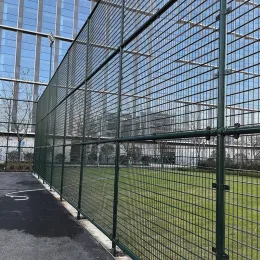Most of us don't spend a lot of time thinking about fences. It’s one of those things that's just there, blending into the background of our everyday lives. But when it comes to securing a property—whether it's a commercial site, an industrial facility, or even a high-security area like a prison—the height of your fence becomes a critical factor. So, how high should a security fence be?
The primary purpose of a security fence is to keep intruders out. This might sound straightforward, but the height of your fence can significantly impact its effectiveness. A standard residential fence, typically around 4 to 6 feet high, might deter casual trespassers, but it won’t stop someone who's determined to get in.

For a fence to be considered a security fence, it should be at least 6 feet tall. This is the bare minimum and is often used for lower-risk areas. However, in most cases, security fences are closer to 8 feet high. This extra height provides a greater deterrent to potential intruders.
Commercial and industrial sites usually require higher fences. An 8-foot fence is quite common in these settings. The added height not only makes it more difficult for intruders to climb over but also sends a clear message that security is a priority. Some high-risk industrial sites might even opt for 10-foot fences to enhance security further.
When it comes to high-security areas like prisons or military installations, the stakes are even higher—literally. Fences in these areas often reach up to 14 feet or more. These towering barriers are designed to be extremely difficult to scale, providing a formidable obstacle to anyone attempting to breach the perimeter.
The height of the fence is just one aspect of security. Fence toppers, such as barbed wire, razor wire, or even electric fencing, can add an extra layer of deterrence. These are particularly useful in high-security areas where the threat level is significant.
It’s not just about what’s above ground. Ensuring your fence extends below ground level can prevent intruders from digging underneath. A solid foundation and possibly a bottom rail can make a huge difference.
Incorporating technology into your security fence can enhance its effectiveness. Motion sensors, cameras, and alarm systems can alert you to any attempts at breaching the fence, providing real-time security monitoring.
While height is crucial, it's important to balance it with other factors. A super-tall fence might be visually imposing and can even affect local regulations and aesthetics. Here are a few considerations to keep in mind:
Before you build a towering fence, check your local regulations. There may be restrictions on how high your fence can be, especially in residential areas. Some areas might require permits for fences above a certain height.
While security is the primary concern, you don't want your fence to be an eyesore. There are ways to design a security fence that is both effective and visually appealing. Consider materials and designs that blend with the surroundings while still providing the necessary security.
Higher fences and additional security measures will obviously cost more. It’s essential to balance your security needs with your budget. Sometimes, a slightly lower fence with advanced security features can be just as effective as a taller one.
So, how high should a security fence be? It really depends on your specific needs and the level of security required. For most commercial and industrial sites, an 8-foot fence with additional security features will suffice. For high-security areas, you might need to go as high as 14 feet or more, with plenty of extra deterrents like razor wire and electronic monitoring.
Remember, no fence is completely impervious, but by choosing the right height and complementing it with other security measures, you can create a formidable barrier that significantly enhances the safety of your property.
Comments
Please Join Us to post.
0